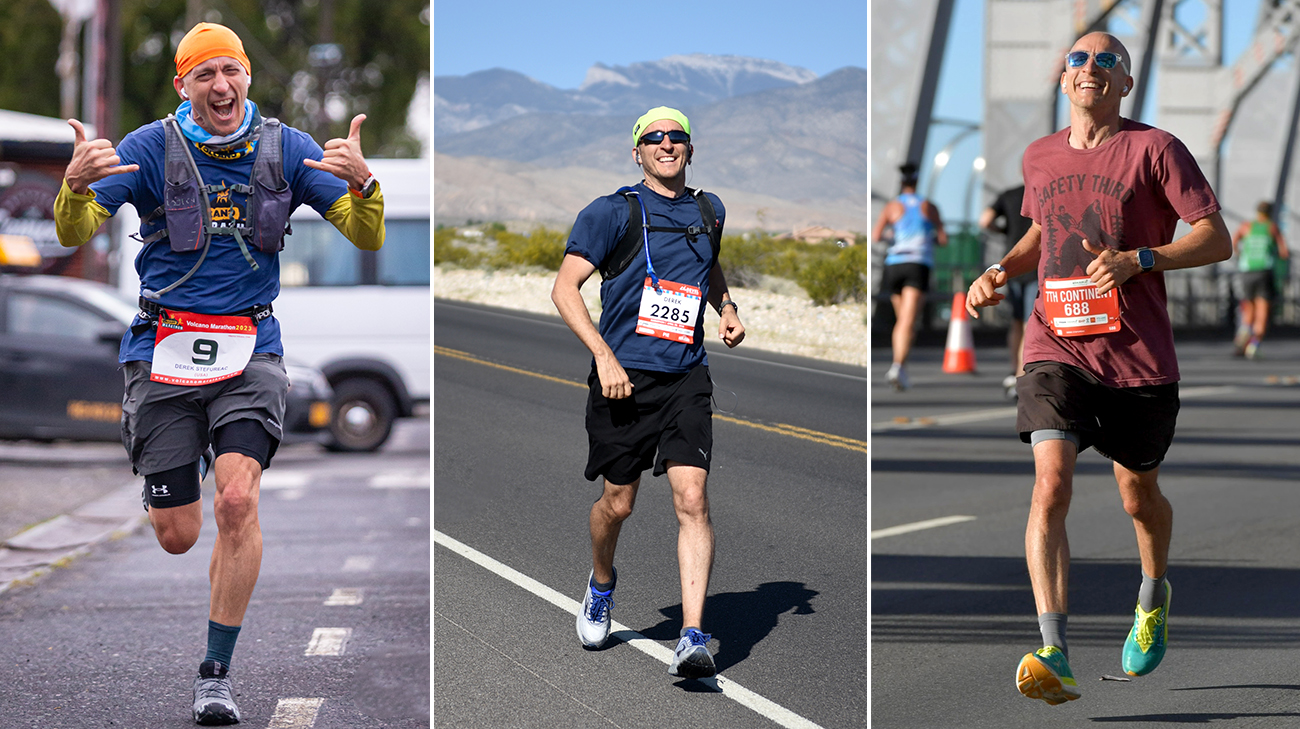
Many people can’t imagine running one marathon, let alone running one on every continent. For 52-year-old Derek Stefureac, that aspiration became a reality on June 2, 2024, when he embarked on the Brisbane Marathon in Australia. This milestone followed Derek’s participation in marathons on six other continents, including one of his most memorable races in Antarctica.
“Antarctica was the first adventure marathon I ever did. I was full of adrenaline and so excited to be there. I felt like I was running on clouds,” says Derek, who recalls completing the race in single-digit temperatures.
Running isn’t necessarily something the Nevada resident thought he would ever take up as a hobby. It was all because of a life-changing diagnosis that came after he noticed a strange numbness in his leg at work one day. Derek followed up with a neurologist who diagnosed him with multiple sclerosis (MS) and referred him to Cleveland Clinic Lou Ruvo Center for Brain Health.
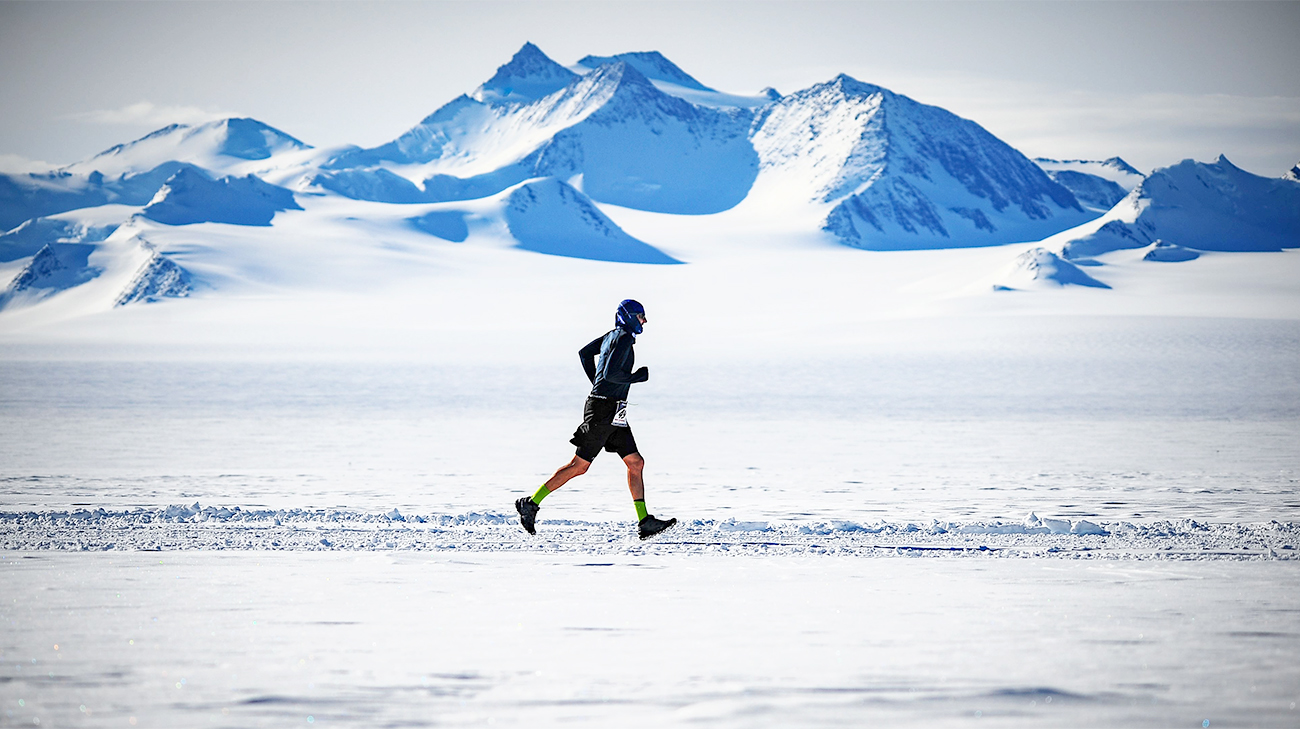
Derek when he ran his first adventure marathon in Antarctica. (Courtesy: Antarctic Ice Marathon)
“Finding out I had multiple sclerosis was like a punch to the stomach. At first, I really didn’t know what MS was or what the various forms of the disease were,” says Derek, who was 39 years old at the time of his diagnosis in 2011.
Although there’s currently no cure for MS, disease-modifying therapies can be used to help significantly reduce relapses for some patients and slow disease progression, which has altered the disease trajectory. Over the past few decades, advancements in treating and understanding the condition are helping improve the health and well-being of many people who live with MS.
After coming to the Lou Ruvo Center for Brain Health, Derek started a medication called glatiramer acetate used to treat relapsing forms of MS, which involves multiple self-injections each week. He also learned that living a healthy lifestyle can be helpful in managing symptoms. Diseases like type 2 diabetes and hypertension are associated with an increased risk of disability from the condition. Maintaining a healthy diet and getting regular exercise can not only prevent or manage these diseases but can help in other ways as well.
“MS is an inflammatory disease, and eating an unhealthy diet causes more inflammation – leading to more neurodegeneration and disability. Consuming a healthy diet can reduce inflammation. Meanwhile, exercise can help rebuild some of the neurological connections damaged by MS,” says Le Hua, MD, the director of the Mellen Program for Multiple Sclerosis at Cleveland Clinic Lou Ruvo Center for Brain Health.
Derek not only wanted to lead a healthier lifestyle for himself but also for his daughter, who was 8 years old when he was diagnosed with the disease. Derek immediately stopped smoking and picked up running.
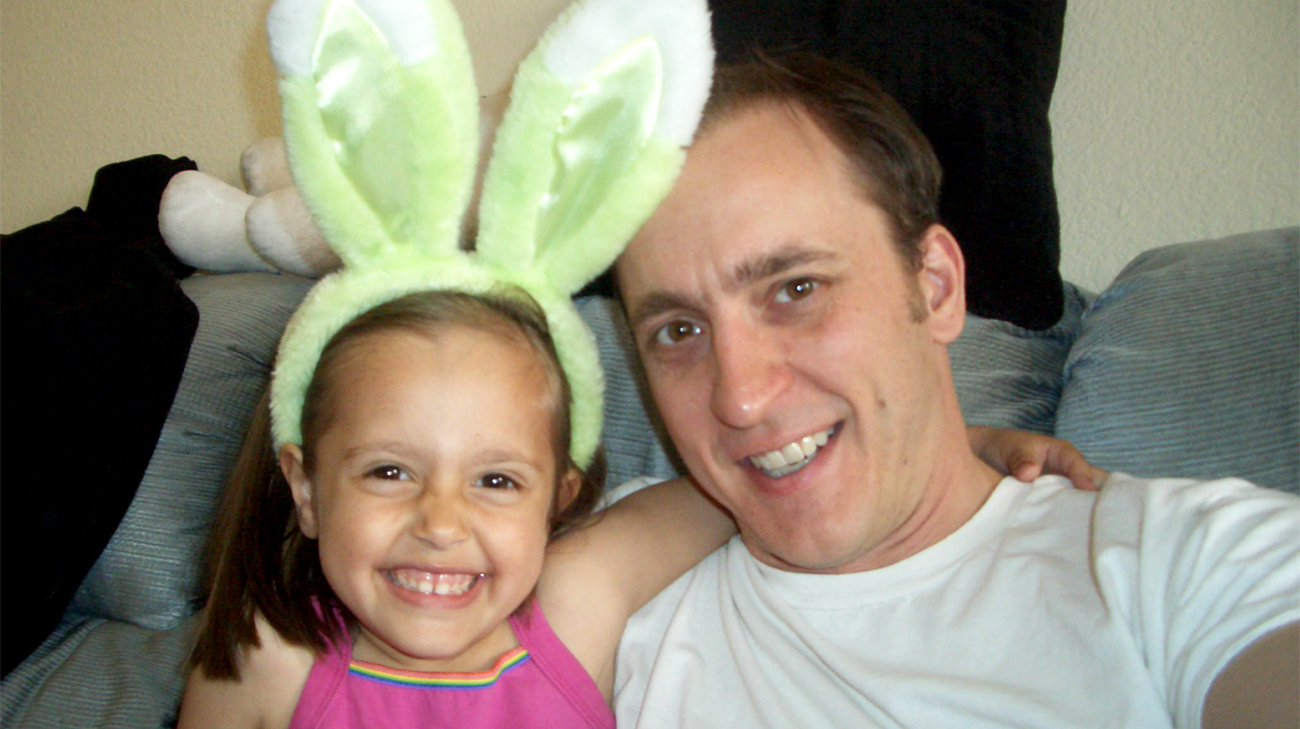
Derek and his daughter before he was diagnosed with multiple sclerosis. (Courtesy: Derek Stefureac)
“I smoked cigarettes for 20 years, and the diagnosis scared me enough to finally quit for good. I wasn't ever really out of shape, but I was never really in shape either, so I thought I could start by running a mile or two,” says Derek.
However, this proved to be challenging at first because MS can cause muscle weakness, loss of balance and difficulty walking. After running for a while, Derek would notice weakness in his left leg, causing him to limp. But he was able to continue pushing forward.
“I first started limping after running just one mile, but then it wouldn’t happen until after two miles, then three miles and so forth. The more I ran, the less I experienced leg weakness. Then I thought, ‘Hey, I’m going to sign up for one of those races where you get a number on you,’” says Derek.
He thought a full marathon would be impossible at the time, so Derek started by running a half marathon near his home. Although he had to walk the last few miles, he finished the race and signed up for another half marathon the next month. Derek’s leg started to feel weak with about a mile left to go in the second race. Determined to finish, he dragged his foot behind him the rest of the way. At the end of this half marathon, his toes were sticking out of a hole he had worn in his shoe.
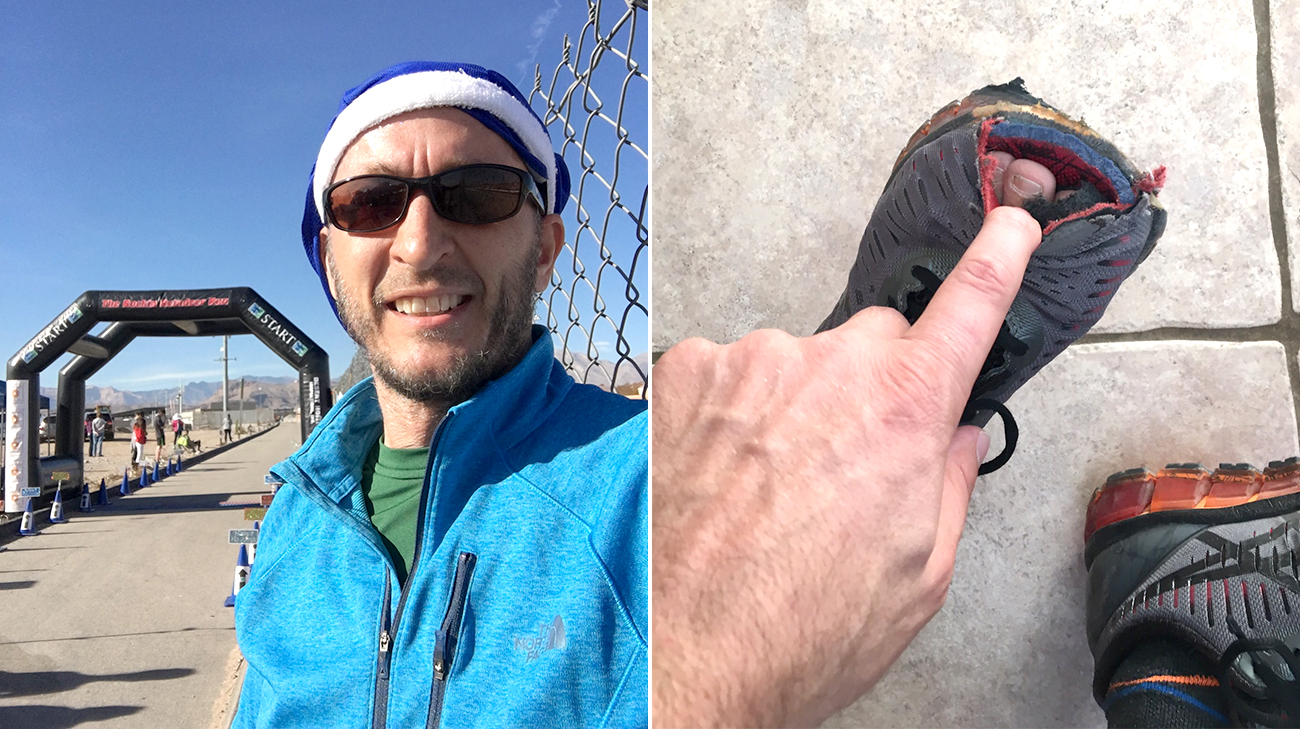
During a half marathon, Derek had to drag his foot for a portion of the race. At the end of the race, he had worn a hole in his shoe. (Courtesy: Derek Stefureac)
“I could see the finish line, and I didn’t want to let MS stop me. I knew I could keep going,” says Derek.
Along with closely following his treatment regimen, Derek continued running until he says he didn’t experience leg weakness anymore. He was soon ready for a new challenge after completing 30 half marathons and his first full marathon in Las Vegas. That’s when he signed up for the 2021 Antarctic Ice Marathon.
“Going to Antarctica to run a marathon felt epic, and nobody could tell I had multiple sclerosis. I want to do these things just as a person and not a guy with MS,” says Derek.
Following Antarctica, Derek traveled to Asia to hike to the base of Mount Everest and run a marathon after. His ventures have also taken him to France and Chile. Through these excursions, he began meeting other people passionate about running and set his goal of completing a marathon on every continent. At the start of his journey, Derek hadn’t taken part in a single race since middle school. But with Dr. Hua’s encouragement to stay active, his determination and his symptoms at bay, Derek reached his goal after running the marathon in Australia.
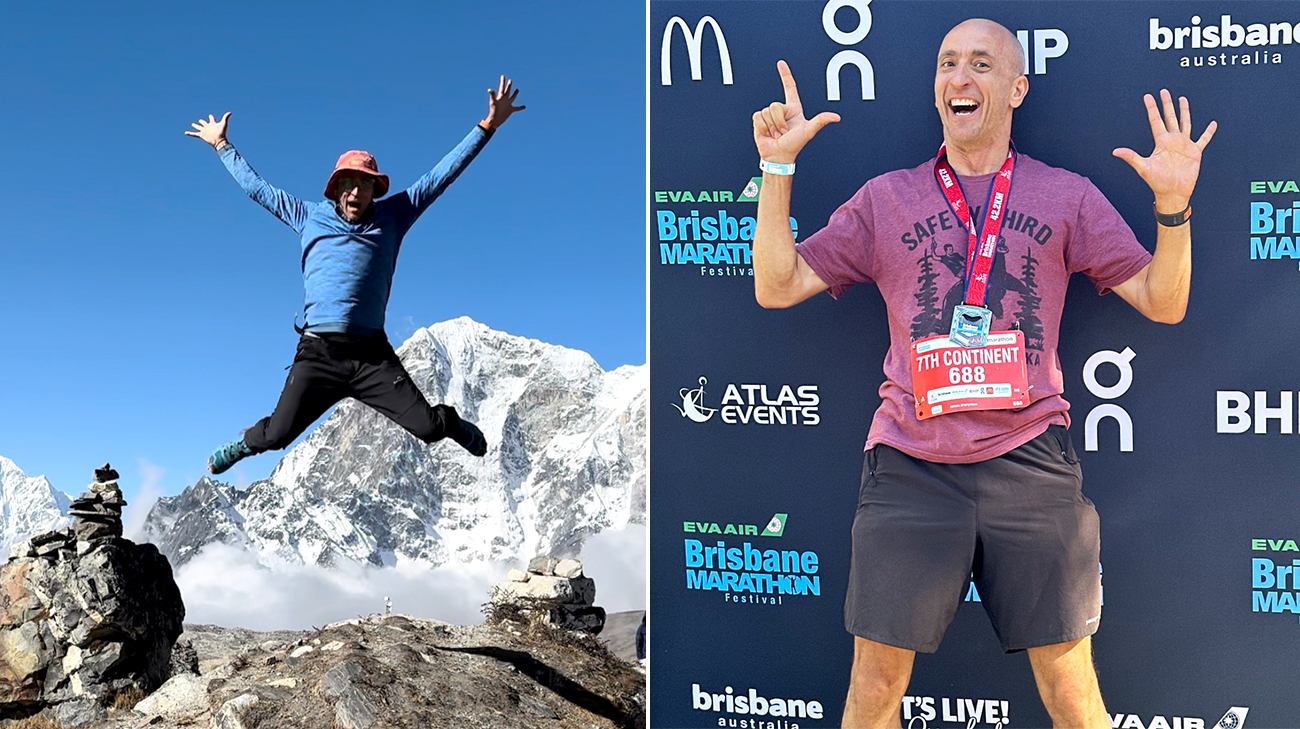
Derek jumping in front of the Himalayas. (left) Derek finishing the Brisbane Marathon in Australia. (right) (Courtesy: Derek Stefureac)
“Even though Australia was the seventh one, I’d like to go do it all over again. This feels like just a stop along the way, and I’ve got my sights set on my next goals,” says Derek.
Through his active lifestyle and treatment, fortunately, Derek has not experienced a relapse in multiple years. He continues to follow up annually with Dr. Hua.
“I look forward to seeing Dr. Hua and telling her what crazy marathon I’ve ran since I saw her last. She's totally been behind all the things I’ve done – never limiting in any way,” says Derek.
He looks forward to more traveling and quality time with his daughter. Derek tries to keep a positive attitude and knows how important that is to maintain even when things aren’t going well. He hopes sharing his story will help others with MS.
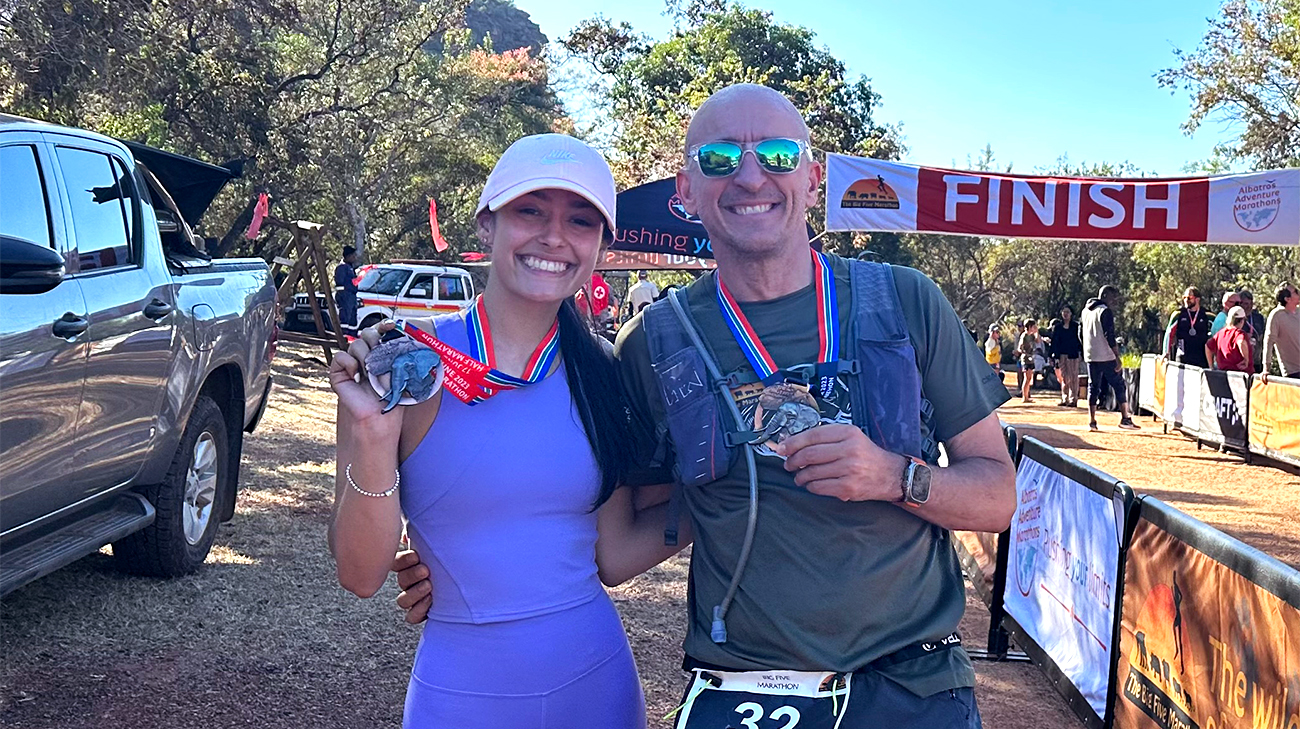
Derek and his daughter at a marathon in Africa. (Courtesy: Derek Stefureac)
Dr. Hua adds, “It can be devastating to find out you have MS, but we can always do something to improve quality of life even if the diagnosis is delayed. Delivering that initial news doesn't have to be as devastating when you know there's hope on the horizon.”
“This diagnosis has been a major turning point for me. Without it, I never would have changed my life. I travel the world, I’m fit and I'm fortunate I haven’t had relapses. Being diagnosed with MS doesn't have to be the end. I'm grateful it’s helped shape a new beginning,” says Derek.
Related Institutes: Neurological Institute

